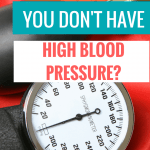Thanks to updated guidelines, you may have high blood pressure. Take a second and find out about your numbers-it could save your life!
In November 2017, the American College of Cardiology (ACC) and the American Heart Association (AHA) made new recommendations.
These new guidelines impact both the definition and the management of blood pressure.
Instead of just 1 in 3 people having hypertension (elevated blood pressure), expect that nearly half (46%) of the U.S. adult population will fall into that category.
The greatest impact is expected among younger people.
In fact, the authors of the guideline note the prevalence of hypertension is expected to triple among men under age 45 and double among women under 45.
New Guideline Details
The new ACC/AHA guidelines were developed with nine other health professional organizations. And they were written by a panel of 21 scientists and health experts who reviewed more than 900 published studies.
The committee recommended lowering the definition of high blood pressure.
The committee lowered the range to account for the complications that can occur at lower numbers, and this decision allows healthcare providers to provide earlier intervention.
These recent changes lower the normal blood pressure range to a systolic pressure of <120 mm Hg and a diastolic of <80 mm Hg. (120/80 mm Hg).
Paul K. Whelton, MB, MD, MSc, FACC, lead author of the guidelines, explains why:
“You’ve already doubled your risk of cardiovascular complications compared to those with a normal level of blood pressure.”
“We want to be straight with people – if you already have a doubling of risk, you need to know about it.
It doesn’t mean you need medication, but it’s a yellow light that you need to be lowering your blood pressure, mainly with non-drug approaches.”
In other words, non-drug approaches represent your self-care!
Is Your Blood Pressure in the Normal Range?
The new guidelines list a different way of grouping the categories:
- Normal: Less than 120/80 mm Hg;
- Elevated: Systolic between 120-129 and diastolic less than 80;
- Stage 1: Systolic between 130-139 or diastolic between 80-89;
- Stage 2: Systolic at least 140 or diastolic at least 90 mm Hg;
- Hypertensive crisis: Systolic over 180 and/or diastolic over 120, with patients needing prompt changes in medication if there are no other indications of problems, or immediate hospitalization if there are signs of organ damage.
More information about the new categories is available in this American College of Cardiology patient graphic.
If you have hypertension, and you don’t have a primary care provider, I recommend you find one to ensure consistent management.
What to Do if Your Pressure is Abnormal
As stated above, patients “are already at up to double the risk of having a major cardiac event—a heart attack or stroke—compared to those with a normal blood pressure.”
You need to work with a healthcare provider to determine which category your pressure reading will fall into. Your provider will consider the category recommendations in addition to what risk factors you may have to decide treatment.
Treatment recommendations and options are specified for providers in the report, and can become more complicated with stage 1 and stage 2 categories.
Treatment will be determined based on your risk and other health findings noted by your provider. Note, you may need to see a specialist or go to a specific health system to receive the right healthcare.
One interesting piece in the report called “What to Tell Your Patients”:
Of those who fall into the new elevated range, and stage 1 high blood pressure categories, only a small number will need blood pressure-lowering medication.
However, everyone in these groups should be making important lifestyle changes known to drive down blood pressure levels.
As you probably expect, lifestyle modifications are essential to the management of high blood pressure.
In fact, the report states, “Lifestyle changes are key.”
“Making healthy lifestyle changes is an important part of treatment for everyone, regardless of how high your blood pressure is and whether or not you are taking one or more blood pressure-lowering medications. Lifestyle changes can lead to big improvements in your blood pressure and reduce your risk for heart problems.”
A quick list of lifestyle recommendations or lowering remedies include:
-Lose weight
-Eat a heart-healthy diet (the COC suggests the DASH Diet and increasing potassium-rich foods)
-Move your body more
-Avoid or limit alcohol
In closing, the bottom line: KNOWING whether you have high blood pressure is a critical step to lowering your risk for a significant cardiac event like a heart attack or stroke.
First, find a provider. Then follow your healthcare provider’s treatment plan. Following the plan is crucial to the success of your blood pressure management.
Remember, whether you need to take medications along with making lifestyle modifications, or you just need to make lifestyle changes; the point to remember is that good self-care can lower your risk, and improve your condition.
Lifestyle changes are not always easy to do. However, it IS possible, and they will impact your health, help to lower your blood pressure and lower your risk of heart attack or stroke. The best way to do that is to take it one step at a time.
Do you feel like you need a little more help finding the motivation to start taking better care of yourself? Sign up for my FREE 5-day Bible study “Be Well Through Worship”. Find the motivation to start performing the self-care you know you need-without the guilt! See more HERE.
Be sure to pin for later!


Be sure to grab your FREE Self-care Starter Guide! Lisa Kimrey is a 33-year veteran registered nurse (RN), speaker, and author of the Bible study, The Self-care Impact: Motivation and Inspiration for Wellness. At Mylifenurse, Lisa combines her nursing expertise with Scripture-based encouragement to show readers who serve and care for others how to begin and maintain their self-care journey – without feeling guilty or overwhelmed – to feel happy, healthy, and rejuvenated.
